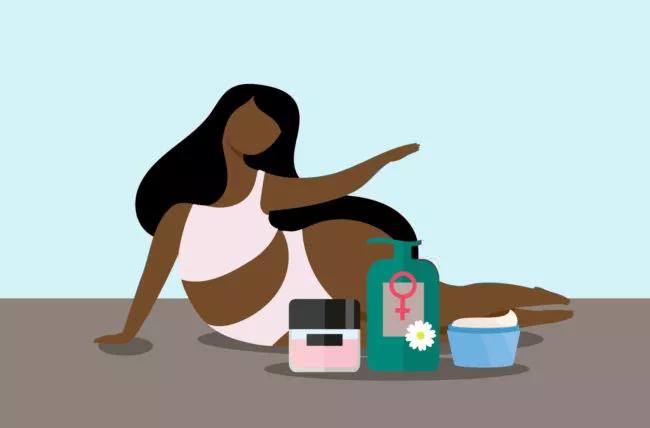Moisturizers, lubes and prescriptions can all be helpful

Image content: This image is available to view online.
View image online (https://assets.clevelandclinic.org/transform/86d3c14b-31af-4c48-8530-76eda2ddb462/VaginalDryness-1299476677-770x533-1-650x428-2_jpg)
Drawing of woman lying next to bottles of moisturizers and creams
Almost every woman has experienced vaginal dryness, even if they don’t talk about it. It affects women of all ages and for lots of different reasons. Most women will find themselves dealing with vaginal dryness at least once in their lives.
Advertisement
Cleveland Clinic is a non-profit academic medical center. Advertising on our site helps support our mission. We do not endorse non-Cleveland Clinic products or services. Policy
When your vaginal walls are too dry, you might experience pain or chafing during sex, as well as itching, burning and urinary problems.
The good news is that many different products can help. The downside? One trip down the pharmacy aisle might leave your head spinning. Should you use lube or moisturizer? Is a “natural” lube better than a synthetic one? Can you just use coconut oil?
Ob/Gyn Swapna Kollikonda, MD, explains the different vaginal dryness solutions available and how to choose one.
Think of a vaginal moisturizer like a facial moisturizer for your genital area. You apply it regularly to treat and prevent dryness and discomfort. You can use vaginal moisturizers before sex, but they don’t replace a lubricant.
“Vaginal moisturizers help make vaginal tissue healthier,” says Dr. Kollikonda. “Most vaginal moisturizing products are safe to use inside the vagina and around the outside, too. But always read the instructions and ask your healthcare provider if you’re not sure. Only use moisturizers formulated for the genital area.”
You use a lubricant right before sexual activity to increase comfort and decrease chafing and irritation. And with so many varieties available, you’re bound to find one that works for you.
Advertisement
Water-based vaginal lubricants are often the first line of defense if you have discomfort or chafing during sex. “Water-based lubricants usually have minimal ingredients and a low chance of causing irritation or a reaction,” says Dr. Kollikonda. “But because they’re water-based, they don’t last as long as other formulas. They also wash off very easily.”
If you’re looking for a natural lubricant that’s safe to use with condoms, check out the water-based options. Look for lubes that contain glycerin or aloe vera with a short ingredient list.
If you have sensitive skin, choose a water-based product that doesn’t contain:
For a longer-lasting, thicker lube with more glide, try silicone-based lubricants. Just be aware that these products come with some potential downsides, including:
Like water-based lubricants, silicone lubes are safe to use with latex condoms. But they’re not considered natural, as silicone is a synthetic ingredient.
Natural oils like coconut, sweet almond or olive oils have their place in a dry skin routine. But don’t use them as vaginal moisturizers or lubes.
“Many food-based oils are natural, but natural doesn’t always mean safer or better,” explains Dr. Kollikonda. “Oils destroy latex condoms, so you lose your protection from pregnancy or sexually transmitted infections. They’re also greasy and messy and can be difficult to wash off.”
Synthetic oils like petroleum jelly or baby oil are equally bad for condoms. They may also raise your risk of a vaginal infection. One more thing to note: The U.S. Food and Drug Administration (FDA) has not approved these oils as vaginal lubricants.
If vaginal moisturizers and lubricants aren’t doing the job, it may be time for prescription medications. The catch, though, is that these medications are only for postmenopausal women.
If you meet the criteria, your doctor may prescribe:
Advertisement
If you’re looking for a treatment that doesn’t involve medications or creams, then vaginal rejuvenation might be worth a look. These procedures use lasers or radiofrequency waves to stimulate the growth of new tissue in your vaginal wall.
“Vaginal laser and radiofrequency treatments create small scratches in the vaginal wall,” says Dr. Kollikonda. “As the tissue heals, the vaginal walls thicken and regain some of their natural lubrication. The treatments should cause little to no pain, but you need multiple treatments for full results.”
Vaginal rejuvenation procedures are not FDA-approved, so ask about the benefits and risks before committing. “Use a licensed medical provider and get the details about the procedure and recovery,” advises Dr. Kollikonda. “Be aware that the cost for these procedures can be high, and insurance does not cover them.”
“Vaginal dryness is a common problem, but many people aren’t comfortable telling their doctors about it,” says Dr. Kollikonda. “But it’s a quality-of-life issue. Don’t let embarrassment stop you from getting the treatment you need.”
Advertisement

Sign up for our Health Essentials emails for expert guidance on nutrition, fitness, sleep, skin care and more.
Learn more about our editorial process.
Advertisement
Bleeding is a risk and warrants taking care, but the reward of this lifesaving medication is great
Severe and debilitating headaches can affect the quality of your child’s life
With repeat injections over time, you may be able to slow the development of new wrinkles
Although it can be alarming, it’s normal to experience blood clots during menstruation
Stretch before heading outside, keep proper form and avoid jerking or twisting to throw snow
Type 2 diabetes isn’t inevitable with these dietary changes
Applying a hot or cold compress can help with pain
Pump up your iron intake with foods like tuna, tofu and turkey